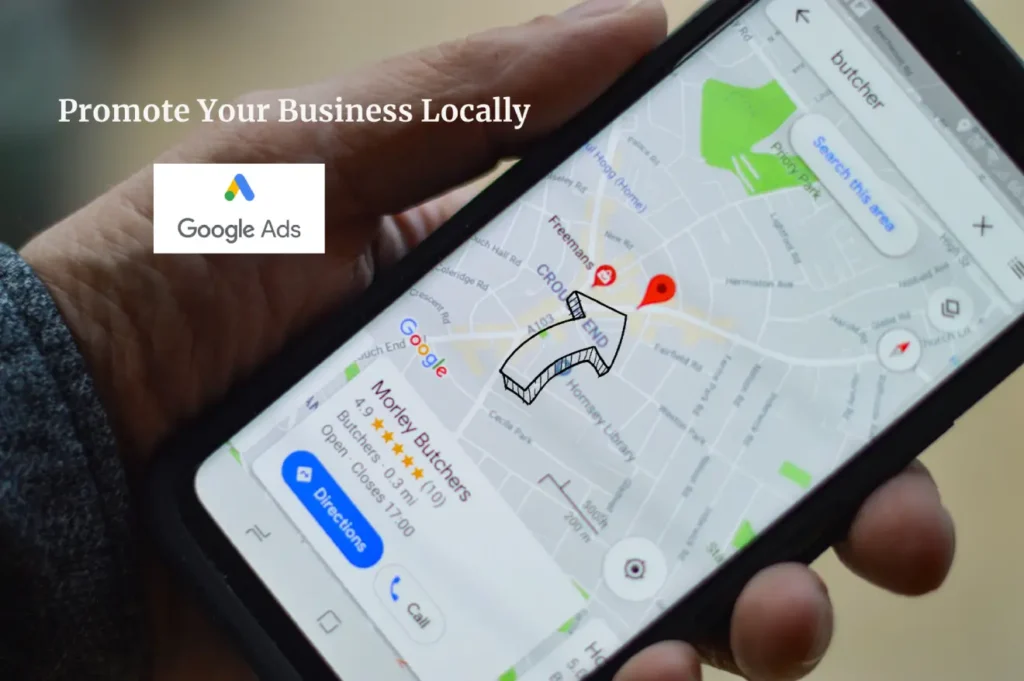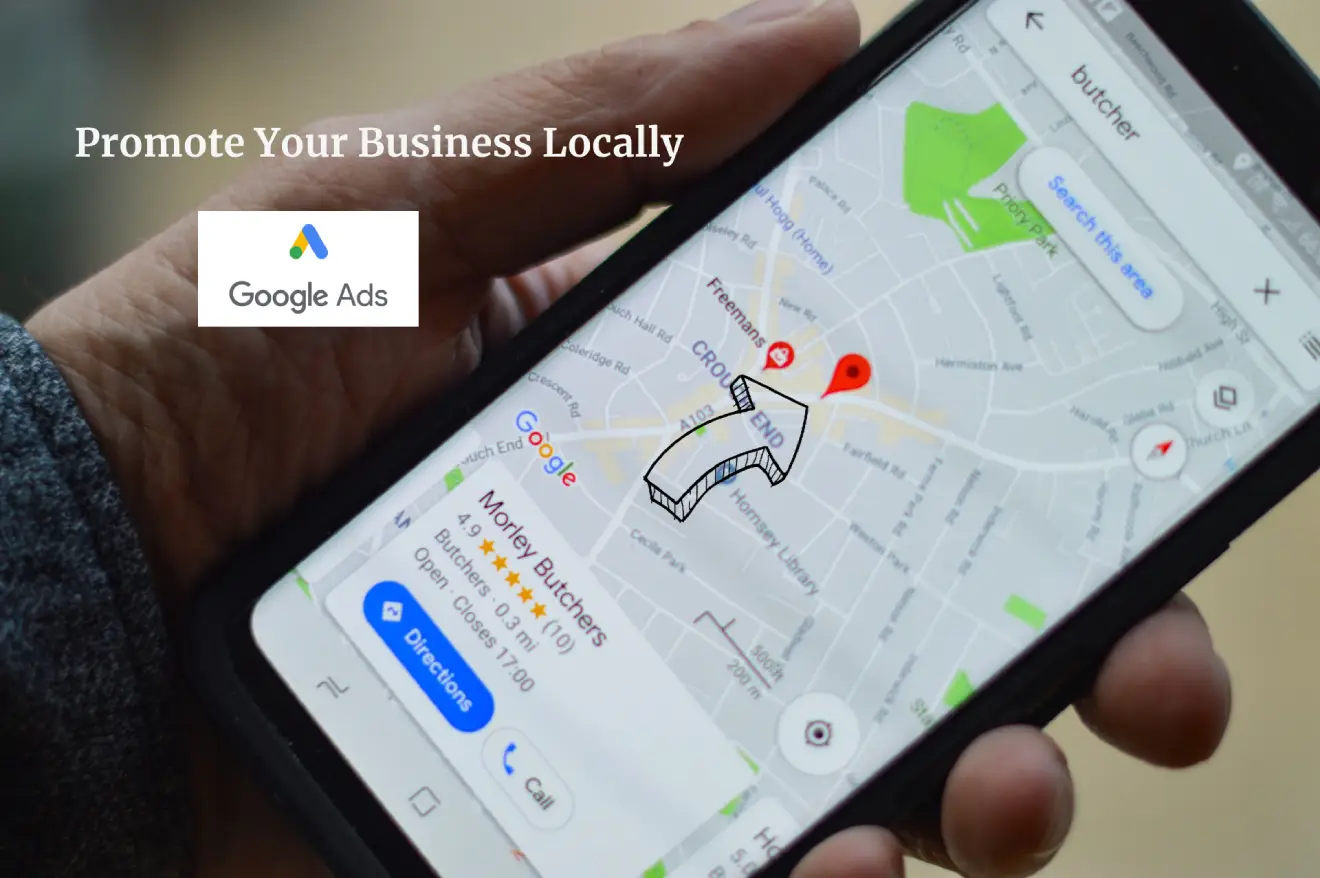Office No. 608, Lunkad Sky Station, Viman Nagar Road, Pune, Maharashtra 411014, India
Phone: +1 213-261-0597
contact@techthinkmarketing.com
Promote Your Business Locally If you want to promote your business locally, you should consider the following strategies:

- Online Presence: Create a user-friendly website that provides all the essential information about your business, such as your contact details and a clear call to action. Make sure it works well on mobile devices.
- Social Media Marketing: Set up profiles for your business on popular social media platforms like Facebook, Instagram, and Twitter. Share engaging content related to your business, including photos, videos, promotions, and customer testimonials. Interact with your local community by responding to comments and messages.
- Email Marketing: Collect email addresses from your local customers and send them newsletters and promotions. Use email marketing to keep your audience informed about upcoming events, new products, or special offers.
- Local SEO: Optimize your website for local search engine optimization (SEO) by including your city or region in title tags, meta descriptions, and the content. Get listed in local business directories and review websites like Yelp, TripAdvisor, and Yellow Pages.
- Content Marketing: Create valuable and informative content that’s relevant to your local audience. This could be in the form of blog posts, videos, or infographics. Share your content on social media and your website.
- Engage with Local Influencers: Collaborate with local influencers who have a strong following in your area. They can help promote your business to their followers.
- Local Advertising: Invest in online advertising through platforms like Facebook Ads, Google Ads, or Instagram Ads, targeting users in your local area. Consider sponsoring local events, sports teams, or community organizations.
- Local Partnerships: Partner with other local businesses for joint promotions or events. Cross-promotion can help expand your reach.
- Community Involvement: Participate in local events, fairs, and community gatherings. Sponsor or host events to showcase your products or services.
- Customer Reviews and Testimonials: Encourage satisfied customers to leave reviews on platforms like Google and Yelp. Positive reviews can significantly boost your local reputation.
- Referral Programs: Implement a referral program that rewards you for referring new clients to your business.
- Networking: Attend local business networking events, chamber of commerce meetings, and industry-related conferences to connect with other local businesses and potential clients.
Promote Your Business Locally Remember, promoting your business locally is an ongoing effort. Consistency and a genuine connection with your local community will help build trust and customer loyalty. Analyze the effectiveness of your strategies and adapt them as needed to continue growing your business locally.



What is best way to advertise your business locally?
Promote Your Business Locally The best way to advertise your business locally can vary depending on your industry, target audience, and budget. However, a combination of these strategies often proves effective:
- Google My Business (GMB) Optimization: Claim and optimize your Google My Business listing. This will help your business appear in local search results, and it provides essential information like your address, hours, and reviews. Encourage satisfied customers to leave positive reviews on your GMB page.
- Local SEO: Optimize your website for local search engine optimization. Use location-specific keywords in your website content, title tags, and meta descriptions. Also, ensure your website is mobile-friendly and loads quickly.
- Social Media Marketing: Establish a strong presence on social media platforms that your local audience frequents. Share engaging content, interact with followers, and consider using paid advertising to target a local audience.
- Online Directories and Review Sites: Get listed in local business directories and review websites like Yelp, TripAdvisor, Yellow Pages, and industry-specific directories. Maintain consistent information across all these platforms.
- Local Content Marketing: Create content that’s relevant to your local community. This could include blog posts, videos, and infographics that address local issues, events, or news. Share this content on your website and social media.
- Local Advertising: Invest in online advertising through platforms like Facebook Ads, Google Ads, and Instagram Ads. You can target users in your local area, making it cost-effective and efficient.
- Community Engagement: Get involved in your local community by participating in events, sponsoring local sports teams or charities, or hosting community events. This not only promotes your business but also builds goodwill in the community.
- Networking: Attend local business networking events, chamber of commerce meetings, and industry-related conferences. Building relationships with other local business owners can lead to collaborative opportunities.
- Email Marketing: Collect email addresses from your local customers and send them newsletters, promotions, and updates about your business. Personalize your emails to cater to local interests and events.
- Customer Reviews and Testimonials: Encourage satisfied customers to leave positive reviews on platforms like Google, Yelp, and your website. Good reviews can significantly boost your reputation locally.
- Local Partnerships: Partner with other local businesses for cross-promotions or co-hosting events. This can help you reach a broader audience.
- Referral Programs: Implement a referral program that rewards your existing customers for referring new clients to your business. Word-of-mouth marketing is powerful at the local level.
Promote Your Business Locally The best approach is often a combination of these strategies. Regularly assess and adjust your marketing efforts based on the results you see. Keep in mind that building a strong local presence takes time and consistent effort, so be patient and persistent in your local advertising efforts.
What are 5 ways to promote a business?
Promoting a business effectively involves a mix of strategies to reach a broader audience and engage with potential customers. Here are five key ways to promote a business:
- Digital Marketing:
- Social Media Marketing: Establish and maintain a presence on popular social media platforms like Facebook, Instagram, Twitter, and LinkedIn. Share engaging content, interact with your audience, and use paid advertising to reach a targeted demographic.
- Email Marketing: Build an email list of customers and prospects and send regular newsletters, promotions, and updates to keep them engaged and informed.
- Search Engine Optimization (SEO): Optimize your website for search engines so that it ranks higher in search results. This helps increase organic traffic to your website.
- Pay-Per-Click (PPC) Advertising: Use platforms like Google Ads to create targeted advertising campaigns. You pay only when a user clicks on your ad.
- Content Marketing:
- Create valuable, informative, and relevant content. This can include blog posts, articles, videos, infographics, and podcasts. Share this content on your website and through social media to position yourself as an expert in your industry and attract an audience interested in your products or services.
- Offline Marketing:
- Print Advertising: Consider placing ads in local newspapers, magazines, or industry publications to reach a different demographic.
- Direct Mail: Send physical mailers, flyers, or postcards to potential customers in your target area.
- Networking: Attend industry-specific events, trade shows, and local business gatherings to connect with other professionals and potential clients.
- Partnerships and Collaborations:
- Form partnerships with other businesses or influencers in your industry. Collaborative efforts can help you reach a broader audience and build credibility.
- Consider cross-promotions where you and another business promote each other’s products or services to your respective customer bases.
- Referral and Loyalty Programs:
- Encourage satisfied customers to refer friends and family to your business. Create a referral program that rewards both the referrer and the new customer.
- Implement a loyalty program that offers discounts or exclusive perks to repeat customers, incentivizing them to continue doing business with you.
Promote Your Business Locally Remember, the effectiveness of these strategies can vary based on your specific industry and target audience. It’s essential to track the results of your marketing efforts and adjust your approach as needed to maximize your business’s promotion and growth.
Google Ads Campaigns for Local Business
Promote Your Business Locally Google Ads offers several different campaign types, each suited for various business goals and industries. Here are some common Google Ads campaign types and examples of the types of businesses they are suitable for:
- Search Campaigns:
- Example: A local bakery or a dentist’s office can use search campaigns to target people actively searching for keywords like “fresh pastries near me” or “dental checkup.”
- Display Campaigns:
- Example: E-commerce businesses that want to increase brand awareness or reach a wider audience can use display campaigns to show image and text ads on websites and apps within the Google Display Network.
- Shopping Campaigns:
- Example: Online retail stores can use shopping campaigns to showcase their products and prices. These ads are highly visual and are great for businesses selling physical products.
- Video Campaigns (YouTube Ads):
- Example: A fitness coach can use video campaigns to reach a global audience with workout tutorials, while a local real estate agent can use them to showcase property listings to a local market.
- App Campaigns:
- Example: Mobile app developers can use app campaigns to promote their apps to a global audience. This is ideal for businesses in the mobile app industry.
- Local Campaigns:
- Example: Local brick-and-mortar businesses like restaurants, retail stores, and service providers can use local campaigns to drive in-store visits, phone calls, or website visits from nearby customers.
- Smart Campaigns:
- Example: Small businesses with limited time and expertise can use smart campaigns to have Google’s automated systems create and manage their ads. This is suitable for a wide range of local businesses.
- Display Campaigns with Custom Intent or In-Market Audiences:
- Example: A home decor store can use display campaigns with custom intent audiences to target users who have recently searched for home renovation ideas. In-market audiences can help car dealerships target users actively shopping for new cars.
- Remarketing Campaigns:
- Example: E-commerce businesses can use remarketing campaigns to re-engage past website visitors who didn’t make a purchase. Service providers can use them to stay top-of-mind with previous leads.
- Lead Generation Campaigns:
- Example: B2B businesses like marketing agencies or software companies can use lead generation campaigns to collect contact information from potential clients through lead forms on Google.
Promote Your Business Locally Remember that the choice of campaign type should align with your business objectives and target audience. The success of your Google Ads campaigns depends on creating compelling ad copy, using relevant keywords, setting appropriate bid strategies, and continually monitoring and optimizing your campaigns to achieve your specific goals.





